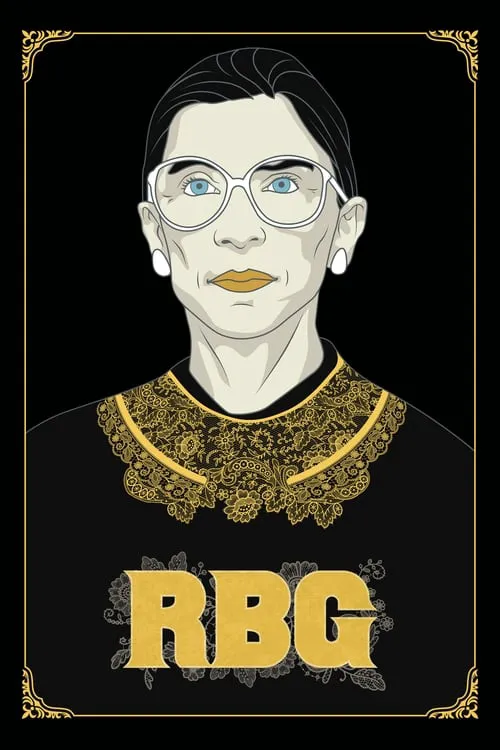RBG

Plot
Justice Ruth Bader Ginsburg's life is a testament to the unwavering dedication to her craft and the profound impact she has made on the nation's highest court. At 84 years young, Ginsburg continued to push herself with unrelenting passion, steadfast in her pursuit of justice and equality for all citizens. Born on March 15, 1933, in Brooklyn, New York, Ginsburg was raised in a family that valued education and the importance of living a life of service. This early instilled sense of duty and responsibility would go on to shape Ginsburg's future and set her on a path that would make her an iconic figure in American jurisprudence. Ginsburg's early life was marked by academic achievement, with the young Ruth winning a coveted spot at Cornell University, where she was one of only nine women in a class of 500 students. It was at Cornell that Ginsburg met her future husband, Martin 'Marty' Ginsburg, a young man from a similar background who shared her intellectual curiosity and passion for life. The couple married in 1954, and their relationship would become a cornerstone of Ginsburg's life, providing her with love, support, and a partner who understood her unwavering dedication to her work. Ginsburg's entry into the world of law was not taken lightly, however. In the early 1950s, women were woefully underrepresented in the field, and few institutions were open to accepting them. Despite these obstacles, Ginsburg persevered, graduating at the top of her class from Harvard Law School in 1956 after being accepted into the school the year before, only to become one of its first female students. Her experiences at Harvard, however, only reinforced her determination to forge a path that would see women play a more prominent role in the law. Following law school, Ginsburg moved to New York, where she joined her husband in private practice. Her experience practicing law in a male-dominated field was marked by sexism and sexism-based obstacles, but she persisted, using her experiences to inform her growing advocacy for women's rights. When her children were old enough to attend school full-time, Ginsburg joined the American Civil Liberties Union (ACLU), where she would work tirelessly for over a decade, arguing nine landmark cases before the Supreme Court. Ginsburg's most notable cases during this time, Berhardt v. CelaneseCorp andFrontiero v. Richardson, challenged the constitutionality of policies that discriminated against women. In both cases, Ginsburg argued that such policies were in direct conflict with the 14th Amendment's Equal ProtectionClause. Her arguments were met with resistance, but she refused to back down. TheFrontiero case, which challenged the military's policy of denying benefits to the wives of servicemen while extending them to the wives of servicewomen, was particularly groundbreaking. Ginsburg's arguments before the Court would ultimately lead to the landmark decision, Frontiero v. Richardson, in 1973, which found the policy unconstitutional. In 1980, President Jimmy Carter named Ginsburg to the United States Court of Appeals for the District of Columbia Circuit, a position she held for 13 years, becoming the second female judge to be appointed to the federal bench. It was during this time that Ginsburg's reputation as a fierce advocate for women's rights and a stalwart defender of the Constitution continued to grow. In 1993, President Bill Clinton appointed Ginsburg to the Supreme Court, making her the Court's second female member and the Court's first Jewish female justice. Ginsburg's confirmation was not without controversy, however. Her nomination faced fierce opposition from groups who feared her advocacy for women's rights would lead to the erosion of traditional values. Despite these challenges, Ginsburg's confirmation by the Senate on August 3, 1993, paved the way for a new era of representation and diversity on the Court. As a Justice on the Supreme Court, Ginsburg would go on to become one of the Court's most vocal and influential liberals, earning the nickname 'The Notorious RBG.' Her opinions have become famous for their incisive and witty critique, which has been described as both elegant and biting. Ginsburg has argued over 90 cases before the Court, many of which have had significant impacts on the law and society. Ginsburg's most famous dissenting opinion, United States v. Virginia, was delivered in 1996. In it, Ginsburg challenged the constitutionality of the Virginia Military Institute's (VMI) male-only admissions policy. VMI argued that its admissions policy was aimed at preserving the institute's unique culture and history, but Ginsburg's opinion exposed the inherent sex bias at the root of the policy. The case ultimately led to the Court's landmark decision in 1997, which found the policy unconstitutional. Over the course of her time on the Court, Ginsburg has become a beacon of hope for those fighting for justice and equality. Her legacy is a testament to the power of perseverance and the impact one person can have on the world.
Reviews
Recommendations




